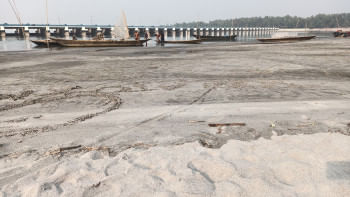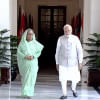Hasina-Modi meeting bodes well for stronger ties

The meetings between prime ministers Sheikh Hasina and Narendra Modi just before the G20 Summit has further consolidated the bilateral relations between Bangladesh and India. The Indian premier's expression of gratitude for the Bangladesh government's role in ensuring peace in India's northeast region is a fact for which the Hasina government deserves full credit. The invitation extended to our prime minister to attend the G20 Summit was indeed a most welcome gesture. It is a further testimony to the personal dynamics between the two heads of states that have developed over the years and deepened the strategic ties between the two countries. Although it is not expected that major bilateral issues will be solved on the sidelines of such a summit, it is encouraging to note that both sides expressed the commitment to collaborate and cooperate on ensuring political and economic stability.
At the same time, we must note that although three MoUs have already been signed at the meeting, they did not apparently address some of the issues brought forward by our prime minister. One was to request India to ensure uninterrupted supplies of essential goods to Bangladesh, which is crucial for food security as well as to maintain price stability of essentials – a critical factor in an election year. Bangladesh-India trade is about $14 billion, and essential commodities comprise a major part of it. The other important issue was Hasina's request to Modi to extend cooperation for quick repatriation of the Rohingya to Myanmar. As we know, Bangladesh and Myanmar are working on repatriating 3,000 Rohingya initially, with mediation by China. We hope that the "constructive and positive approach" expressed by the Indian prime minister in safe and sustainable repatriation will have a significant impact in the near future.
The meeting with the Indian prime minister holds special significance for Bangladesh's prime minister because it is taking place only a few months before our national election. Speculations continue regarding India's neutral stance regarding the Bangladesh election, which is quite different from that of the Western nations, who have been reiterating their wish to see free and fair polls here. But it is quite evident that the Modi government would prefer a continuation of the deep ties that have been developed over the years with Bangladesh, thanks to Prime Minister Sheikh Hasina.
Bangladesh is one of the most important strategic partners of India, and India is Bangladesh's most important neighbour as the latter shares almost the whole of its border with the former (except for the small stretch with Myanmar). Therefore, it is in the interests of both countries to smooth out whatever unresolved issues there are between them. For Bangladesh, it is important that India takes decisive measures to resolve the long-standing water-sharing issues (especially that concerning the Teesta River), the significant trade deficit with India, and the border killings which still continue. We hope that the warmth and bonhomie shared by the two prime ministers will lead to greater economic and strategic ties that will be mutually beneficial.
Follow The Daily Star Opinion on Facebook for the latest opinions, commentaries and analyses by experts and professionals. To contribute your article or letter to The Daily Star Opinion, see our guidelines for submission.


 For all latest news, follow The Daily Star's Google News channel.
For all latest news, follow The Daily Star's Google News channel. 









Comments